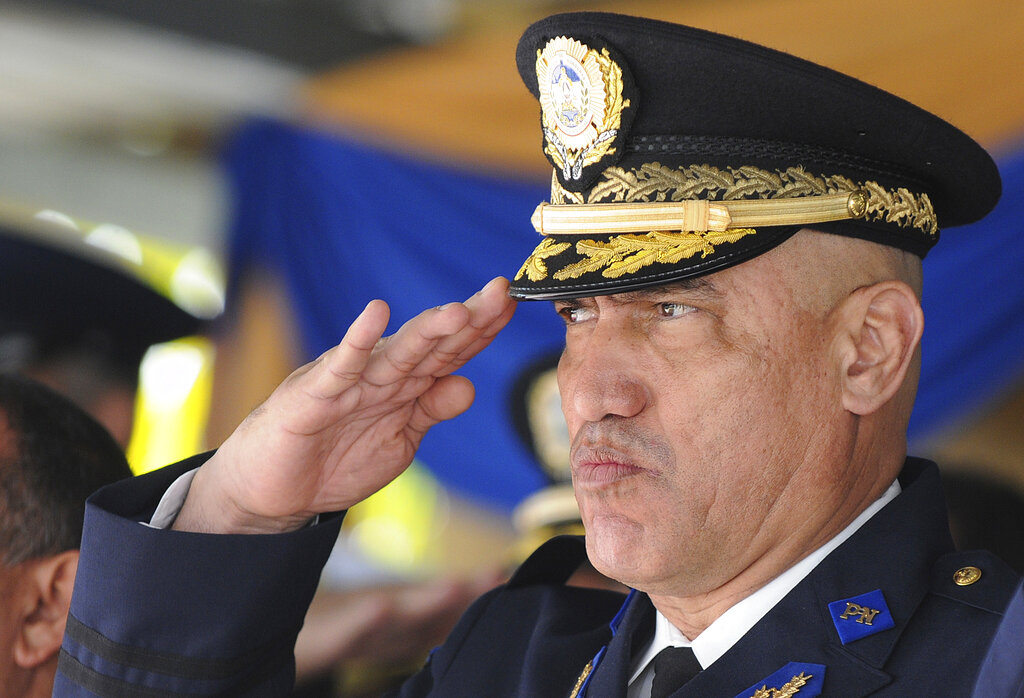
Honduras Police Chief Gen. Juan Carlos Bonilla Valladares, also known as the Tiger, or “El Tigre,” salutes during an event in Tegucigalpa, Honduras in this December 2012 file photo. (AP)
TEGUCIGALPA, Honduras — References to the Honduran president appear throughout U.S. prosecutors’ statements announcing drug trafficking charges against the former chief of Honduras’ national police this week.
For months, the U.S. Attorney’s Office in Manhattan has been signaling that the ultimate objective of years of investigation and methodically built cases could be President Juan Orlando Hernández.
“The noose is definitely tightening given the information that is coming out,” said Eric Olson, a global fellow at The Wilson Center’s Latin America program. “I thought that the statement from the U.S. attorney made an even more direct link to the president.”
The president’s brother, Tony Hernández, has already been convicted and is awaiting sentencing next month.
To get that far, prosecutors explained how drug trafficking proceeds — including $1 million from notorious Mexican kingpin Joaquin “El Chapo” Guzman — allegedly propelled President Hernández’s political ascent in exchange for favors that allowed cocaine to move freely through the country toward the United States.
But on Thursday, U.S. Attorney Geoffrey Berman in announcing charges against Juan Carlos “The Tiger” Bonilla said the allegedly corrupt cop had overseen the shipment of multi-ton loads of U.S.-bound cocaine “on behalf of convicted former Honduran congressman Tony Hernández and his brother the president.”
The president has always denied any ties to drug trafficking and did so again late Thursday, though most Hondurans long ago wrote off their president as corrupt.
Juan Orlando Hernández has always said the allegations come from drug traffickers upset that he allowed their extradition to the U.S. “No president complicit with drug trafficking would promote and implement the extradition of drug traffickers,” he said in a statement.
In the case of Bonilla, Hernández took credit for pushing him out as police director following his election. But Olson noted that Bonilla remained on the police payroll in other positions until 2016.
Still, President Hernández received a call from President Donald Trump just a week ago.
“President Trump extended his appreciation for the critical role the Government of Honduras has played in addressing the root causes of irregular and illegal migration to the United States,” according to a White House summary of the call. There has been consensus for some time however that the barely credible presidency of Hernández is one of the root causes of that migration.
And on Friday, an agreement between the U.S. and Honduras went into effect that will allow the U.S. to ship non-Honduran asylum seekers to Honduras rather than allow them to apply for asylum in the U.S.
Hernández often holds up his cooperation with the U.S. government as proof of his innocence. Federal prosecutors in New York appear to see things differently.
Prosecutors said that the president’s brother told a cooperating witness that Juan Orlando Hernández and his brother “helped Bonilla Valladares advance his position within the Honduran National Police, and that Bonilla Valladares protected their drug trafficking activities in return.”
Olson, whose Wilson Center report on efforts to purge corruption from Honduras’ National Police was also cited in Hernández’s denial late Thursday, said he can imagine two scenarios going forward. In one, U.S. prosecutors charge Hernández when his term ends and in the other he finds a way to seek a third term to avoid U.S. prosecution.
“The news is certainly not good for the president,” Olson said. “He’s already in a pretty difficult and politically weakened position.”
“That’s one reason people have lost faith in government and view the state in many instances as illegitimate,” he said. “This all contributes to people’s sense of hopelessness and leads to migration.”